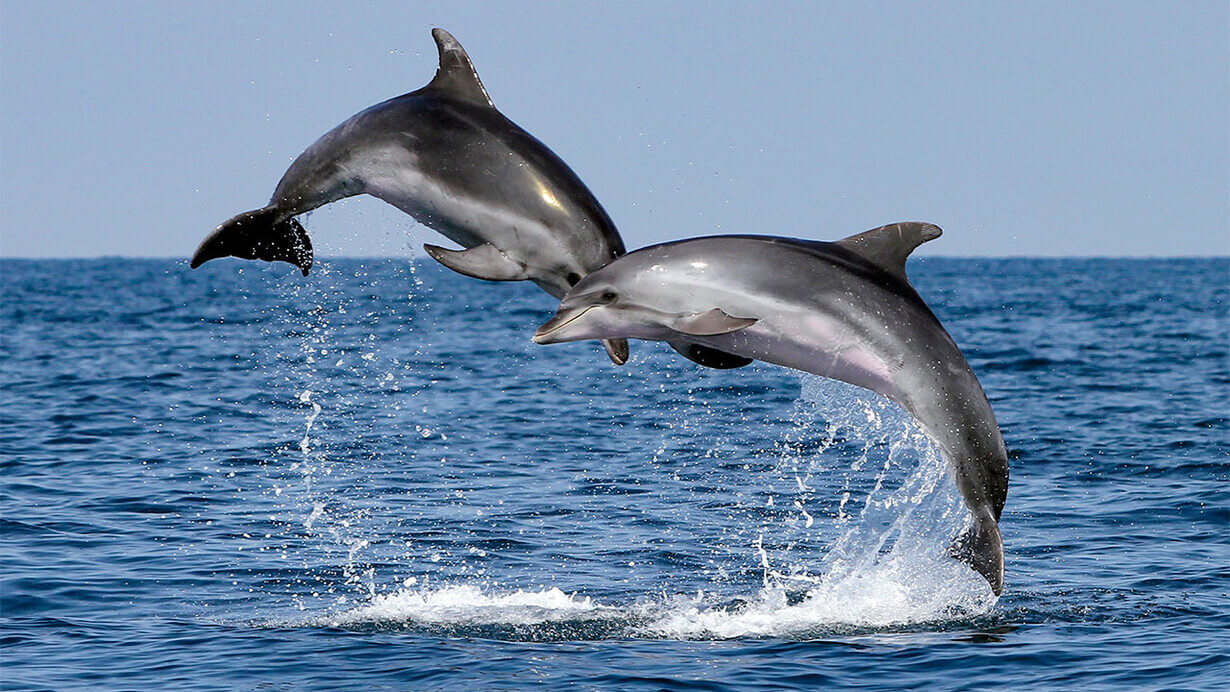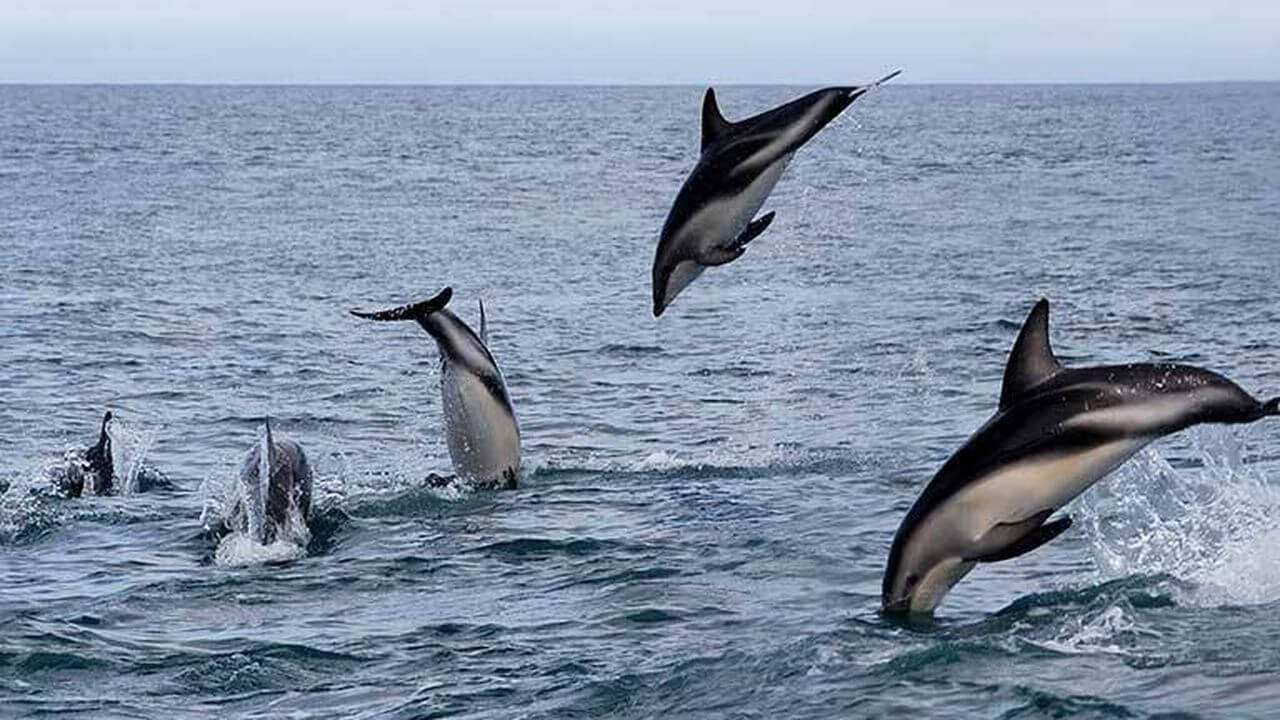Do Dolphins Suffer from Dementia?

Considered one of the most intelligent animals on the planet, dolphins are a species of toothed cetacean with very special characteristics. They inhabit the waters of the Atlantic and Pacific oceans, with great adaptation to tropical climates as well as to icy environments. In this article we’ll be asking whether dolphins suffer from dementia.
They’re recognized mainly for their great intelligence and rapid learning, as well as for their ability to feel complex emotions like humans.
Until recently, it was believed that Homo sapiens was the only mammal on Earth to develop degenerative diseases of the nervous system, such as Alzheimer’s disease or dementia. However, recent research has suggested that dolphins may also be affected. Discover the findings that have led to this conclusion.

Alzheimer’s disease and its possible manifestation in dolphins
Alzheimer’s disease is defined as a progressive degeneration of nerve cells in the brain, accompanied by a marked decrease in brain mass. People suffering from Alzheimer’s disease usually suffer very specific symptoms of this disorder, such as memory loss, confusion, and dementia.
Although it isn’t clear what the main cause is, genetic factors, advanced age, and diseases such as diabetes have been recognized as risk factors for its development.
Dolphins, as with other marine animals, often get stranded. This occurs when one of these species swims into shallow water, becoming stranded or trapped on the shore. Although most cetaceans have an incredible orientation system known as echolocation, more than 2,000 marine mammals such as dolphins and whales die each year due to getting stranded.
Why does it happen?
According to several experts, the sounds emitted by combat and fishing boats can interfere with the echolocation and location processes of these animals, causing them to become lost. However, a study published in the scientific journal European Journal of Neuroscience has suggested that another cause of stranding in dolphins is the degeneration of the central nervous system.
In this research, which analyzed the brains of 22 cetaceans of the species Risso’s dolphins, white-finned pilot whales, harbor porpoises, white-beaked dolphins, and bottlenose dolphins, certain brain changes associated with Alzheimer’s disease in humans were found. It should also be noted that most of these animals were quite old. In addition, they had died when stranded off the coast of Sweden.

The signs of neurological disorders in dolphins
On the one hand, when the brains of each of these animals were examined in detail, beta-amyloid plaques were found on the nerve tissue. This peptide, which under normal conditions plays a fundamental role in the transmission of information between neurons, tends to accumulate abnormally on nerve cells in neurological disorders such as Alzheimer’s disease.
This phenomenon, in addition to generating an incorrect connection between neurons, causes their degeneration and death.
On the other hand, the accumulation of another protein called tau in neurons was also found. This is related to the degeneration and formation of neurofibrillary tangles that affect the correct functioning of the central nervous system.
In addition, an abnormal number of glial cells such as astrocytes and microglia, a factor associated with inflammatory processes in the brain, was detected.
Finally, another paper called Molecular basis of Alzheimer’s disease in dolphins indicated that these mammals express the proteins most directly involved in the formation of beta-amyloid plaques, similar to what occurs in humans.
How dementia and massive strandings are related
Although one might think that all dolphins that die offshore suffer from some form of dementia, the reality may be otherwise. On the one hand, this particular cetacean species is gregarious, that is, they live in groups of up to 30 or more individuals. In addition, there’s a certain hierarchy in their social relationships, so there’s a leader who directs the whole herd.
If we take into account that this animal is usually the most experienced and the oldest, it could be the most prone to suffer degeneration of the central nervous system due to old age.
According to this theory, the leader could be suffering from some kind of dementia and unknowingly lead the rest of the dolphins astray, and they end up getting stranded.
What do humans and dolphins share?
Like humans, dolphins have a longer life expectancy compared to other mammals. In fact, species such as the striped dolphin can live up to 60 years. Accordingly, a study published in the journal, Alzheimer’s and Dementia suggests that dolphins may be more prone to the development of certain diseases such as Alzheimer’s or dementia because of their longevity.
Similarly, in both species, alterations in the normal functioning of the hormone insulin may occur. Consequently, both dolphins and humans are at risk of suffering from diabetes, a risk factor for the manifestation of these central nervous system disorders.

Finally, despite all the findings suggesting that dolphins suffer from some type of dementia, further studies are needed to understand how these neuronal alterations really influence the behavior of these cetaceans. Despite manifesting lesions similar to those found in humans, the diseases could develop in a completely different way.
All cited sources were thoroughly reviewed by our team to ensure their quality, reliability, currency, and validity. The bibliography of this article was considered reliable and of academic or scientific accuracy.
- Mills G. Can dolphins develop Alzheimer’s disease? The Veterinary record. 2023;192(1):8-9.
- Vacher MC, Durrant CS, Rose J, Hall AJ, Spires-Jones TL, Gunn-Moore F, et al. Alzheimer’s disease-like neuropathology in three species of oceanic dolphin. European Journal of Neuroscience. 2022;n/a(n/a).
- Di Guardo G. Alzheimer’s disease, cellular prion protein, and dolphins. Alzheimer’s & Dementia. 2018;14(2):259-60.
- Gunn-Moore D, Kaidanovich-Beilin O, Iradi MCG, Gunn-Moore F, Lovestone S. Alzheimer’s disease in humans and other animals: A consequence of postreproductive life span and longevity rather than aging. Alzheimer’s & Dementia. 2018;14(2):195-204.
- Gallego Iradi MC. Bases moleculares de la enfermedad de Alzheimer en el delfín Universidad de Zaragoza; 2005.
This text is provided for informational purposes only and does not replace consultation with a professional. If in doubt, consult your specialist.